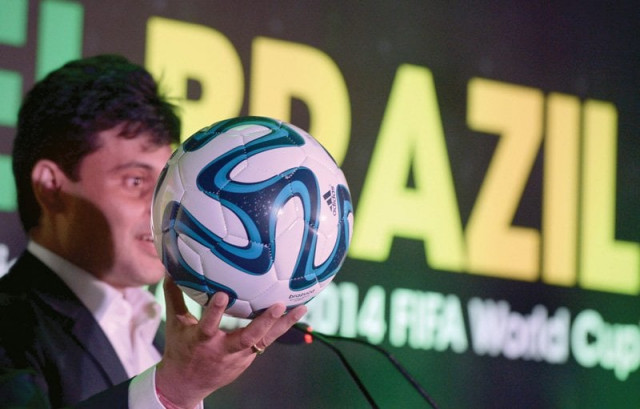Feature : Pakistan workers fire ‘Brazuca’ ball to Brazil
Cricket-mad Pakistan might not have much of a football team but Sialkot has a history of manufacturing top-class balls

The deeper seams and textured surface of the Brazuca disrupts the airflow over its surface, helping it fly more like a traditional 32-panel ball. PHOTO: AFP
She has no idea who Lionel Messi is and her home country isn’t even playing, but Pakistani mother-of-five Gulshan Bibi can’t wait for the World Cup — because she helped make the balls.
When Brazil and Croatia kick off the tournament in Sao Paolo on June 12, there is a good chance they will be using a ball made by Gulshan and her colleagues at the Forward Sports factory in Pakistan’s eastern town of Sialkot.

“I’m really looking forward to the World Cup and Inshallah [God willing] we will watch the matches,” said Gulshan. “All the women who work here are very proud.”
Cricket-mad Pakistan might not have much of a football team – 159th in Fifa’s world rankings – but Sialkot has a long history of manufacturing top-class balls.
Forward Sports has been working with Adidas since 1995 and supplies match balls to some of the world’s top football competitions, including the Champions League, the German Bundesliga – and now the World Cup.
International brands like Adidas now work closely with factories and NGOs to enforce stringent checks to prevent any return to the dark days of children stitching balls in dingy backrooms.
At Forward Sports, workers must provide government ID to prove they are over 18.
And while the basic 1$100 monthly salary might put a $160 Fifa-approved ‘Brazuca’ ball beyond the reach of the workers, several privately said the company looked after them well.
In contrast to the baking, deafening Grand Trunk Road outside where ancient goods trucks, donkey carts and motorbikes overloaded with families and livestock compete to avoid potholes, order and efficiency reign inside the factory.
The whole process from flat panels to finished item takes 40 minutes and the factory can produce up to 100 per hour.
It is a high-tech process for Pakistan, where much of the workforce is unskilled and poorly educated.
“We take unskilled workers and train them — this is a job that is not available anywhere else,” said Forward Sports CEO Khawaja Masood Akhtar.
Ninety percent of those working on the Brazuca were women, and Akhtar said they were more diligent and meticulous than their male colleagues.
Making the Brazuca was no simple matter for Forward, as Adidas gave the order on short notice when they realised their main manufacturer in China was unable to meet the demand.
In just over a month, Forward managed to have the equipment it needed to make the Brazuca from scratch.
The Brazuca was designed after the controversy that dogged the Jabulani ball at South Africa 2010 — slammed for its erratic, unpredictable flight.
Adidas spent two-and-a-half years working on the new ball, testing it in 10 countries with 600 players from 30 teams including Messi, England’s Steven Gerrard and Germany’s Bastian Schweinsteiger.
Published in The Express Tribune, June 4th, 2014.
Like Sports on Facebook, follow @ETribuneSports on Twitter to stay informed and join in the conversation.


















COMMENTS
Comments are moderated and generally will be posted if they are on-topic and not abusive.
For more information, please see our Comments FAQ